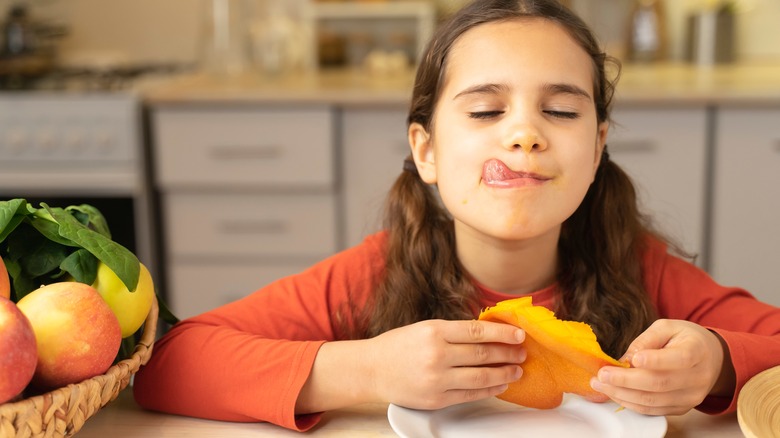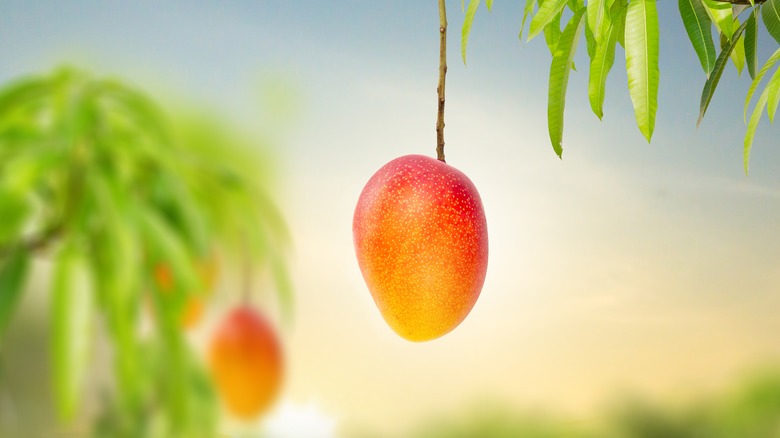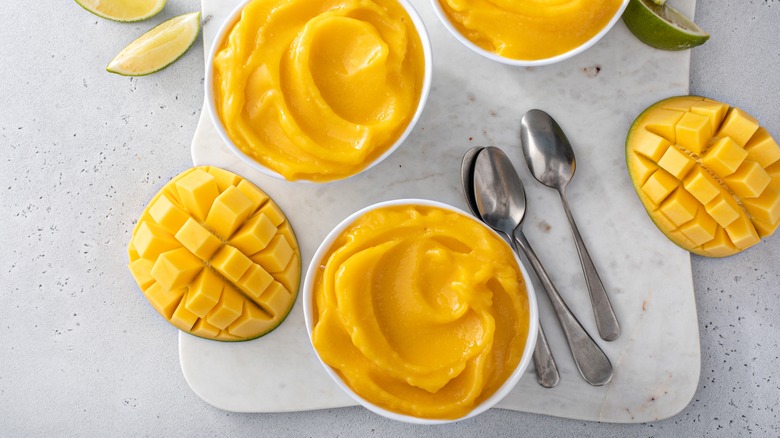Is Mango Healthy For People With Diabetes?
When mangos come to mind, you may think tasty and tropical. Unfortunately, the mention of fruit may trigger a different thought for people with diabetes, since their diet requires limiting carbs and sugar. As you may know, fruit is loved for its natural sweetness — especially the tangy, golden flesh of a mango. But are mangoes a safe sweet choice for people with diabetes?
Mango is a thick-skinned, fleshy fruit, scientifically named Mangifera indica. This drupe is assumed to be a native of India and Southeast Asia (Mango.org). Mangos were brought to South America, Central America, and Mexico. Their trees can now be found throughout California and Florida in the U.S.
Since fruits are rich in natural sugars (fructose), they can bring up concerns for those who need to limit their intake of dietary sugars. The American Diabetes Association (ADA) explains that people with diabetes type 1 and 2 have trouble regulating their blood sugar. This is due to either a lack of insulin or the body's inability to use insulin properly to level out glucose in the blood (per Mayo Clinic).
When someone with this condition eats carbohydrates, the body normally converts them into sugar for energy. Without enough insulin, glucose may stay in the bloodstream and cause hyperglycemia (via ADA). Experts at the American Diabetes Association explain when blood sugar remains high, it could lead to ketoacidosis (a dangerous state that may potentially send someone into a coma).
The lingering question is: do mangoes work against glucose regulation?
Mangoes are a healthy choice
According to Medical News Today, mangoes hover around the midpoint on the glycemic index, near orange juice. The glycemic index is a scale that measures how quickly or gradually a food item spikes blood sugar. It helps develop a health-conscious diet. In moderation, Medical News Today says mangoes are safe for people with diabetes concerns. Portion control is advised to avoid glucose spikes, "A large serving of a low-GI food will usually raise your blood sugar as much as a small amount of a high-GI food," caution WebMD experts. If you have diabetes or prediabetes, enjoy mangoes with care.
These juicy fruits have "superfood" potential, according to Mango.org, so you won't want to cut them out completely. For freshly sliced mangoes, ¾ of a cup is considered one serving. Mango.org says a whole serving, "... provides 50% of your daily vitamin C, 8% of your daily Vitamin A, and 8% of your daily vitamin B6." Additionally, mangos are packed with folate, copper, and around 19 grams of intrinsic sugar. Specialists from WebMD note that mangos are a low GI food and individual reactions may vary. An Everyday Health dietician agreed that people with diabetes can enjoy between 45 to 60 grams of carbs (within a well-rounded meal). This includes whole grains, fruits, protein, veggies, and simple sugars. If you eat fresh mangoes with breakfast, that ¾ cup meets about 30% of the daily suggested intake. Frozen mangoes or mango powder may have a different calorie count.
Man-go for it!
Aside from the nutrient load, you may notice added benefits along with your mangoes. Throughout a 12-week observation period, in 2015, a study concluded that participants with pre-diabetes — people with blood sugar levels too high to be normal, yet too low to be diagnosed with diabetes -– who ate mango each day saw their blood sugar levels significantly reduced and insulin levels increased, compared to a placebo group. Moreover, a 2014 study concluded that even freeze-dried mango powder decreased fasting blood sugar levels in people with obesity. Further research will be necessary to determine exactly how effective mangoes are. From what we see so far, fresh fruit is safe for anyone to enjoy.
The best advice is to eat responsibly, with one additional caveat. Registered Dietician Ansley Hill, from Healthline, indicated everyone's tolerance may be different. She urges people with this condition to start small, with about ½ cup of mangoes, to track glucose fluctuation. She says, "From there, you can adjust your portion sizes and frequency until you find the amount that works best for you." Pairing mangoes with protein is another great solution. Fiber and protein slow down digestion and may keep blood sugar from skyrocketing (per Harvard School of Public Health).
Mangoes are healthy in moderation. People with diabetes would be wise to prioritize choosing fresh fruits, fruit canned in natural juices, or 100% fruit juice as the best options.



